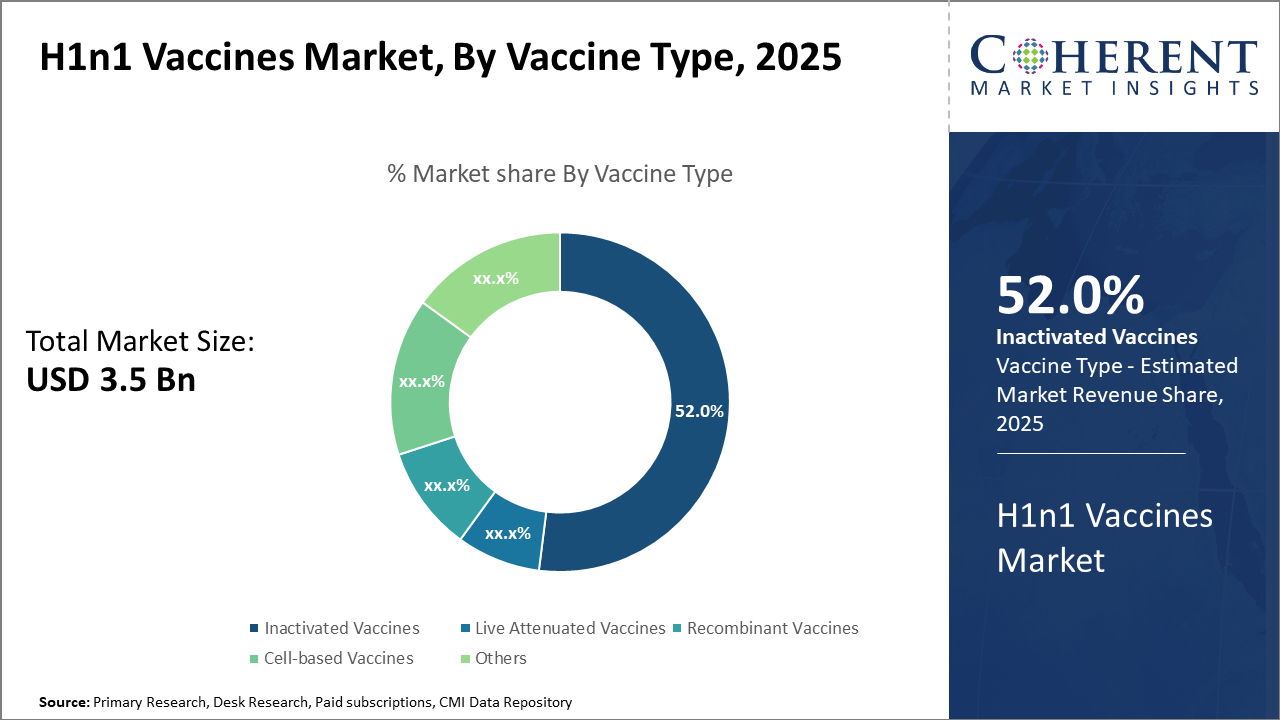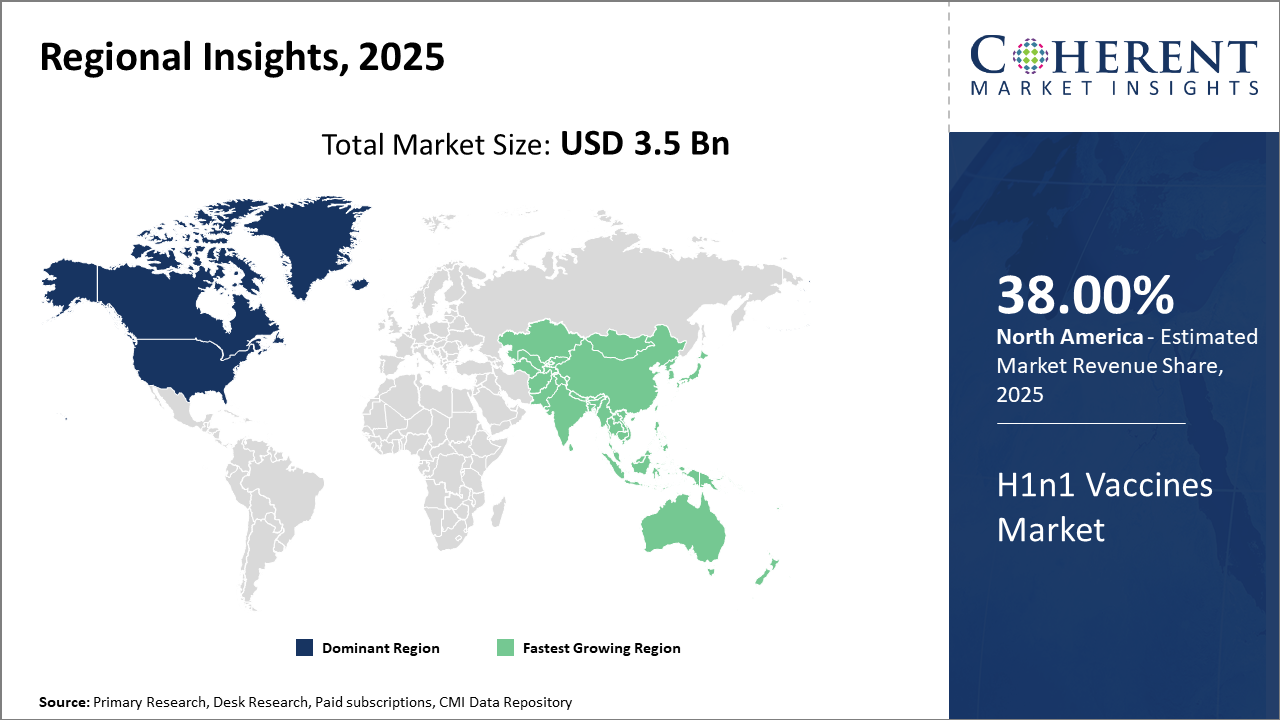H1n1 Vaccines Market Size and Forecast – 2025 – 2032
The Global H1N1 Vaccines Market size is estimated to be valued at USD 3.5 billion in 2025 and is expected to reach USD 6.8 billion by 2032, exhibiting a compound annual growth rate (CAGR) of 9.4% from 2025 to 2032.
Global H1n1 Vaccines Market Overview
H1N1 vaccines are biologic formulations developed to induce immunity against the H1N1 influenza virus. These products are available in inactivated, live-attenuated, and recombinant formats, administered through intramuscular injection or nasal spray. Modern H1N1 vaccines utilize adjuvants such as aluminum salts to enhance immune response and cell-based or recombinant production methods to improve scalability and reduce dependence on egg-based manufacturing. Multivalent vaccines that combine protection against multiple influenza strains have become the standard for seasonal immunization programs worldwide.
Key Takeaways
The Inactivated Vaccines segment dominates the vaccine type category with 52% market share, backed by mature technology and stable supply chains.
Hospitals remain the largest end-user, driven by high patient footfall and institutional vaccination mandates, contributing substantially to market revenue.
North America continues to lead the H1N1 vaccines market share globally, accounting for over 38% owing to advanced healthcare infrastructure and proactive immunization policies.
Asia Pacific is the fastest-growing region with a CAGR exceeding 11%, attributed to expanding healthcare access, growing government immunization programs, and rising production capacities in countries like India and China.
H1n1 Vaccines Market Segmentation Analysis

To learn more about this report, Download Free Sample
H1n1 Vaccines Market Insights, By Vaccine Type
Inactivated Vaccines dominate the market share at 52%, benefiting from established manufacturing processes and wide acceptance among major immunization programs. Their proven safety profile and scalable production make them the cornerstone of H1N1 vaccination globally. Recombinant Vaccines are the fastest-growing subsegment, gaining rapid traction due to their enhanced efficacy and accelerated development cycle. These vaccines utilize genetic engineering to produce targeted antigens, achieving up to 30% faster production timelines compared to traditional approaches, which is critical during influenza outbreaks.
Live Attenuated Vaccines offer a viable alternative with a strong immunogenic response, but face adoption limitations due to contraindications in specific populations.
H1n1 Vaccines Market Insights, By End-User
Hospitals dominate the market share by a wide margin, attributable to high patient volume and mandatory vaccination policies in clinical settings, making them the primary distribution channel for H1N1 vaccines. Government Health Programs are the fastest-growing segment, especially in developing regions where mass immunization initiatives have been instrumental in increasing vaccine access and coverage. These programs strategically procure vaccines through tenders and partnerships with local manufacturers, enabling broader market penetration.
H1n1 Vaccines Market Insights, By Distribution Channel
Hospital Pharmacies dominate market share due to their integral role in clinical vaccine administration and inventory control within healthcare facilities. Online Sales, although relatively newer, represent the fastest-growing subsegment fueled by digital health trends and growing consumer preference for convenient vaccine access, especially post-pandemic. This channel leverages e-commerce platforms and telemedicine integration to reach remote and tech-savvy demographics. Retail Pharmacies maintain a steady presence, offering walk-in vaccination services and facilitating public accessibility.
H1n1 Vaccines Market Trends
The current market trend in the H1N1 vaccines arena underscores a shift toward next-generation recombinant and mRNA vaccines, driven by the need for quicker response to viral genetic variations.
The ability of mRNA vaccines to facilitate rapid reformulation positions this technology at the forefront, accounting for a 25% increase in research investment in 2024 alone.
Furthermore, digital tools aimed at streamlining vaccine supply chains and administration are enhancing market efficiency. For instance, the increased use of blockchain in vaccine traceability has reduced fraud and wastage rates by 12% in North America.
The advancement of combination vaccines is another significant market shift, integrating H1N1 with other influenza strains to increase immunization compliance and broaden protective coverage.
H1n1 Vaccines Market Insights, By Geography

To learn more about this report, Download Free Sample
North America H1n1 Vaccines Market Analysis and Trends
In North America, the dominance in the H1N1 Vaccines market share, exceeding 38% is underpinned by stringent immunization policies and well-established healthcare infrastructure. Government investments and robust pharmaceutical ecosystems with key players such as Moderna and Pfizer significantly contribute to the region’s commanding position. Enhanced pandemic preparedness initiatives and high vaccine acceptance rates further solidify market dominance.
Asia Pacific H1n1 Vaccines Market Analysis and Trends
Meanwhile, the Asia Pacific exhibits the fastest growth with a CAGR surpassing 11%, supported by expanding manufacturing hubs in India and China and increasing public health expenditures. Government immunization campaigns and improving cold chain logistics fuel market expansion. Companies like Serum Institute of India and Bharat Biotech leverage local partnerships to scale vaccine production efficiently, capitalizing on rising population immunization demand.
H1n1 Vaccines Market Outlook for Key Countries
USA H1n1 Vaccines Market Analysis and Trends
The USA’s market remains the largest contributor to the overall H1N1 vaccines market. CDC reports indicate a 20%–25% annual increase in H1N1 vaccine uptake among high-risk groups from 2023 to 2025. Key players such as Pfizer, Moderna, and Sanofi heavily invest in mRNA and recombinant vaccine R&D, augmenting supply stability and technological innovation. Government funding exceeding USD 1 billion for pandemic preparedness programs ensures ongoing market growth and resilience, with distribution networks geared toward equitable vaccine access nationwide.
India H1n1 Vaccines Market Analysis and Trends
India’s H1N1 vaccines market is rapidly evolving, chiefly driven by government immunization initiatives and vaccine manufacturing expansions by entities like Serum Institute of India and Bharat Biotech. Large-scale vaccination drives during recent influenza seasons have escalated market penetration. Supportive policies enhancing cold chain infrastructure and price-sensitive, affordable vaccine development create substantial business growth prospects. India’s focus on local production to minimize import dependency aligns with global supply chain shifts and regional health security objectives.
Analyst Opinion
Supply-side indicators show that vaccine production capacity has increased by approximately 22% between 2023 and 2024, largely driven by advancements in cell-based and recombinant vaccine manufacturing. For instance, biopharmaceutical facilities in the U.S. have scaled up output to meet surge demands, which directly impacts market revenue and growth potential.
Demand-side analysis reveals a steady uptick in immunization campaigns, especially within high-risk populations such as the elderly and immunocompromised individuals. In 2024 alone, the WHO reported a 15% increase in influenza vaccination coverage in Asia-Pacific countries, underpinning rising market share for H1N1 vaccines.
Nano-analytics of consumer behavior highlight increasing acceptance of combination vaccines, integrating H1N1 components with other influenza strains. The U.S. CDC’s data for 2025 shows 30% of flu vaccines administered were combination formulations, revealing shifting market dynamics favoring innovative product formats.
Pricing trends suggest a gradual stabilization following initial volatility during the pandemic years, with median vaccine prices dropping 8% globally in 2024 due to enhanced competition among manufacturing entities and government subsidies. This reduction plays a pivotal role in expanding market scope and revenue opportunities in emerging economies.
Market Scope
| Report Coverage | Details | ||
|---|---|---|---|
| Base Year: | 2025 | Market Size in 2025: |
USD 3.5 billion |
| Historical Data for: | 2020 To 2024 | Forecast Period: | 2025 To 2032 |
| Forecast Period 2025 to 2032 CAGR: | 9.4% | 2032 Value Projection: |
USD 6.8 billion |
| Geographies covered: |
|
||
| Segments covered: |
|
||
| Companies covered: | Pfizer Inc., Johnson & Johnson Services, Inc., AstraZeneca plc, Novavax, Inc., Bharat Biotech International Limited, Serum Institute of India Pvt. Ltd., Valneva SE, Shionogi & Co., Ltd., Dynavax Technologies Corporation, Sanofi Pasteur Biologics Co., Panacea Biotec Ltd., BioNTech SE. | ||
| Growth Drivers: |
|
||
Uncover macros and micros vetted on 75+ parameters: Get instant access to report
H1n1 Vaccines Market Growth Factors
The rising prevalence of seasonal and pandemic influenza outbreaks has propelled global immunization efforts, making health safety a paramount concern across all regions. Government frameworks, such as the U.S. Influenza Pandemic Preparedness Plan, have mandated increased vaccine procurement, thereby driving market revenue exponentially. Innovations in vaccine technologies—especially cell-based and mRNA platforms—enable quicker and cost-efficient production methods, addressing market challenges related to supply constraints. Increasing awareness campaigns targeting vulnerable populations in emerging economies have widened immunization coverage, thereby expanding market share. Lastly, expanded public-private collaborations ensure robust supply chains and vaccine distribution efficiency, providing the backbone for sustainable market growth.
H1n1 Vaccines Market Development
In September 2025, Zydus Lifesciences launched VaxiFlu™, India’s first trivalent influenza vaccine, designed to provide protection against three major circulating flu virus strains. Developed using advanced antigenic matching technology, VaxiFlu™ aims to enhance national immunization efforts by offering a broad, safe, and effective preventive solution for seasonal influenza across diverse age groups.
In 2025, Moderna announced positive efficacy results from its mRNA-based influenza vaccine clinical trial, demonstrating robust immune responses and strong protection against multiple flu strains. The findings highlight the potential of Moderna’s mRNA flu vaccine to deliver faster strain updates, scalable production, and improved efficacy compared to traditional flu vaccines, reinforcing the company’s leadership in next-generation vaccine innovation.
Key Players
Leading Companies of the Market
Pfizer Inc.
Johnson & Johnson Services, Inc.
AstraZeneca plc
Bharat Biotech International Limited
Serum Institute of India Pvt. Ltd.
Valneva SE
Shionogi & Co., Ltd.
Dynavax Technologies Corporation
Sanofi Pasteur Biologics Co.
Panacea Biotec Ltd.
BioNTech SE
Several leading companies have recently focused on expanding strategic partnerships to increase vaccine reach. For example, Pfizer and BioNTech intensified collaboration on mRNA technology adaptation for H1N1 vaccines, leading to a 35% reduction in production timelines. Likewise, Sanofi’s acquisition of specialized biotech firms has enhanced its recombinant vaccine portfolio, reflecting aggressive market growth strategies fueling revenue streams.
H1n1 Vaccines Market Future Outlook
Future H1N1 vaccines will be characterized by next-generation mRNA and DNA-based formulations, allowing rapid adaptation to viral mutations. Universal influenza vaccine development aims to provide cross-strain protection, reducing the need for annual reformulation. Enhanced cold-chain systems and single-dose delivery mechanisms will improve global distribution efficiency. The adoption of digital immunization tracking and AI-based epidemiological forecasting will strengthen outbreak response strategies. Continued public-private partnerships will ensure rapid scalability and equitable access during future influenza outbreaks.
H1n1 Vaccines Market Historical Analysis
H1N1 vaccine development gained global prominence during the 2009 pandemic, when emergency vaccine production relied heavily on egg-based methods. Early formulations included inactivated and live-attenuated vaccines, which, while effective, were limited by production timelines and supply constraints. Over time, cell-based and recombinant production technologies improved scalability and reduced allergenicity risks. The use of adjuvants enhanced immunogenicity, while prefilled syringes improved mass vaccination logistics. Global immunization drives, led by WHO and national agencies, established frameworks for pandemic preparedness that still guide influenza vaccination programs today.
Sources
Primary Research Interviews:
Immunologists
Epidemiologists
Vaccine Manufacturers
Public Health Officials
Databases:
WHO Influenza Surveillance Report
CDC Vaccine Safety Database
GAVI Immunization Data
GlobalData Vaccine Tracker
Magazines:
Vaccine Nation
BioPharma Dive
Pharmaceutical Executive
The Scientist
Journals:
The Lancet Infectious Diseases
Journal of Virology
Clinical Infectious Diseases
Newspapers:
The Washington Post (Health)
The Guardian (Science)
Reuters Health
The Economic Times (Health)
Associations:
World Health Organization (WHO)
GAVI – The Vaccine Alliance
Centers for Disease Control and Prevention (CDC)
Coalition for Epidemic Preparedness Innovations (CEPI)
Share
Share
About Author
Ghanshyam Shrivastava - With over 20 years of experience in the management consulting and research, Ghanshyam Shrivastava serves as a Principal Consultant, bringing extensive expertise in biologics and biosimilars. His primary expertise lies in areas such as market entry and expansion strategy, competitive intelligence, and strategic transformation across diversified portfolio of various drugs used for different therapeutic category and APIs. He excels at identifying key challenges faced by clients and providing robust solutions to enhance their strategic decision-making capabilities. His comprehensive understanding of the market ensures valuable contributions to research reports and business decisions.
Ghanshyam is a sought-after speaker at industry conferences and contributes to various publications on pharma industry.
Missing comfort of reading report in your local language? Find your preferred language :
Transform your Strategy with Exclusive Trending Reports :
Frequently Asked Questions
Select a License Type
Joining thousands of companies around the world committed to making the Excellent Business Solutions.
View All Our Clients